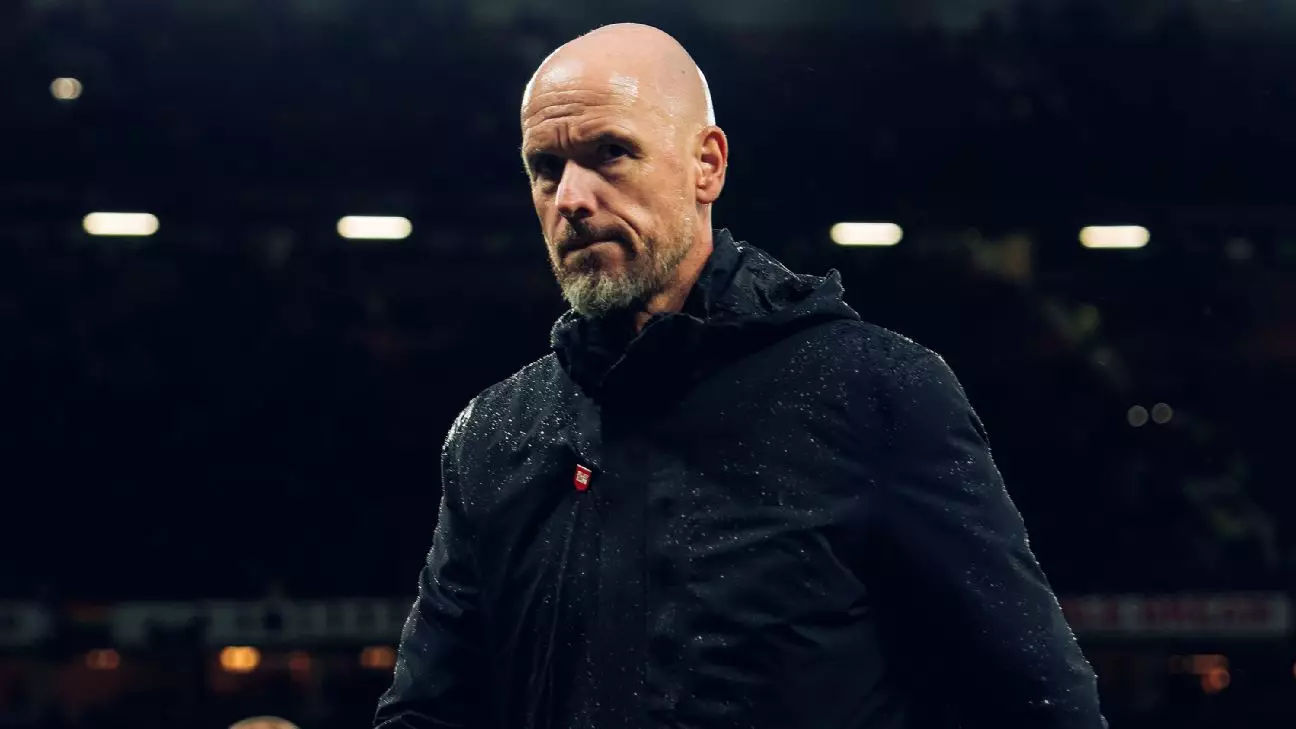As the curtains fall on yet another turbulent chapter at Manchester United, Erik ten Hag finds himself entangled in a web of expectations and disappointments. The 54-year-old Dutchman has now reached a pivotal point in his managerial career, where the pressure to deliver results is mounting alongside increasing scrutiny of his strategies and choices. While he may still be searching for defenders to back up his regime, a slew of successful counterparts in the league starkly highlight his faltering grasp on the job.
The recent 3-0 defeat to Tottenham Hotspur, marking United’s third loss in six league outings, positions the club in an uncomfortable 12th place in the Premier League, trailing leaders Liverpool by eight points. Even more alarming is the club’s lack of offensive potency—United has managed a meager five goals this season, only outperformed by newly promoted Southampton. The grim statistics do not favor ten Hag. Prior to a red card shown to captain Bruno Fernandes, the team struggled to hold its ground against a Spurs side eager to shake off its own pressure. Despite ten Hag’s claim that the red card altered the course of the match, one could argue it merely punctuated an already evident disparity in performance. Tottenham held sway with 60.4% possession, executed 260 passes to United’s 172, and unleashed a barrage of shots that highlighted their offensive intent.
The narrative emerging from Old Trafford under ten Hag has taken to blaming injuries for inconsistent performances. While it is true that injuries can disrupt team dynamics, many managers navigate similar obstacles without resorting to excuses. Ten Hag’s assertions conveniently sidestep unfavorable comparisons with rivals. Managers like Unai Emery and Ange Postecoglou have rapidly transformed struggling squads into competitive teams through coherent strategies and ruthless execution. This contradictory pattern in performance and results has become a source of frustration for United fans, who expect more from a side that has invested £550 million in new talent since ten Hag took the helm.
The former Ajax manager touts his trophy haul, including the Carabao Cup and FA Cup, but it rings hollow when juxtaposed against a grim record that includes historic defeats and a club in disarray. His tenure reached an alarming point when fans witnessed a stunning 7-0 loss at Liverpool last season, illustrating the chasm between expectation and reality. Moreover, in the current season, the dismal showing at home—where they managed merely one goal—paints a troubling picture of a commander struggling to instill confidence in his unit.
Examining managerial performance across the league reveals a striking contrast between ten Hag and his contemporaries. Unai Emery has expertly revitalized Aston Villa, guiding them from relegation fears to a Champions League contender within two years. Similarly, Postecoglou has introduced new life to Tottenham despite inheriting a team that had fallen short in previous seasons. Their successes starkly highlight ten Hag’s stagnation. He brought six new signings into the lineup against Spurs, yet their performance suggested a team not just lacking chemistry, but one possibly devoid of a clear managerial vision.
The fact that new entrants at clubs like Liverpool and Chelsea—Slot and Maresca, respectively—have already made significant impacts underscores the notion that managerial acuity and vision can trump the necessity of a lengthy tenure. The increasing desperation at Old Trafford is palpable, as the management team, including Jim Ratcliffe and Dave Brailsford, contemplates necessary changes should the club continue on this downward trajectory.
As Manchester United gears up for a challenging Europa League match against FC Porto followed by a critical league fixture against Aston Villa, the stakes could not be higher for ten Hag. There is little room for error; victories are a must, as positive performances without tangible results will only serve to heighten the unrest among stakeholders and supporters alike. The alarm bells are ringing intensely, a fact not lost on ten Hag, who continues to project confidence in public.
Yet the reality remains stark: this is his squad, comprising a blend of seasoned players and younger talent, yet there exists a glaring disconnect on the field. After the defeat to Tottenham, ten Hag’s unwavering insistence that he does not fear for his job hints at an obliviousness to the severity of the situation he faces. Without a robust change in tactics and mentality, the boat he claims they are “all in together” risks sailing into troubled waters.
With time quickly running out, one must ponder whether ten Hag possesses the necessary skill set and charisma to steer United out of this crisis. If he cannot muster a turnaround, not just in results but in the overall ethos of the team, the repercussions could very well be dire—not just for his career, but for a club that desperately desires a return to glory.

